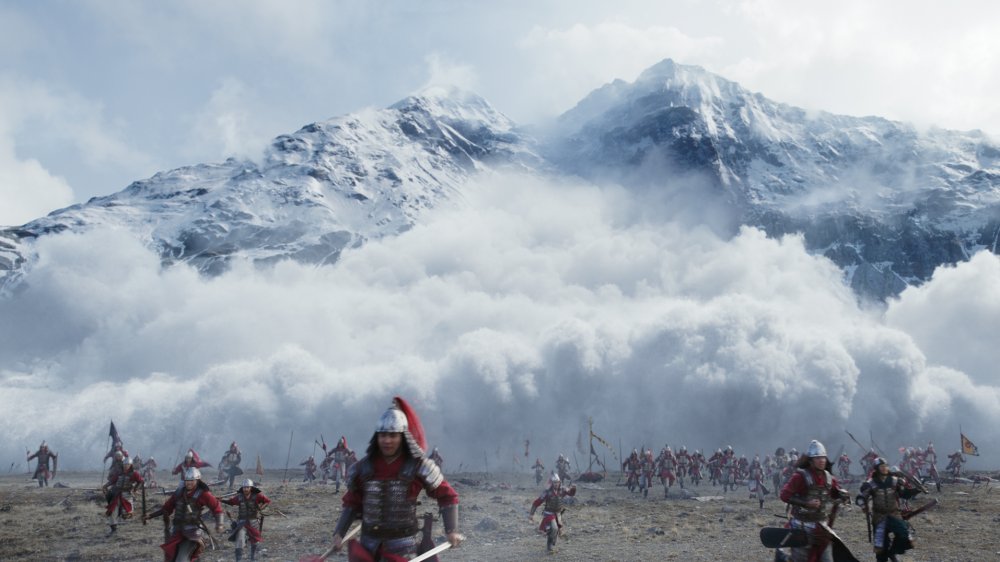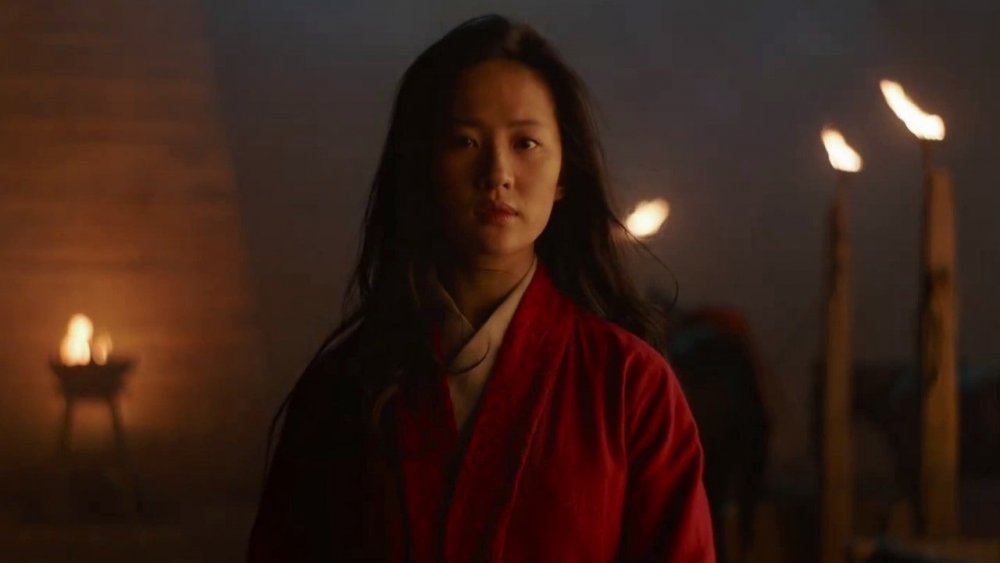China Just Took The Mulan Situation To Another Level
The initial announcement that Disney was going to be producing a live-action remake of Mulan, one of its most beloved modern animated films, was met with excitement. However, it didn't take long for the setbacks and controversies to start piling up. There were calls for boycotts after the movie's star, Liu Yifei, came out with public support for Hong Kong's police forces, frustration over the fact that the new movie wouldn't contain any musical numbers, and, of course, delays thanks to the COVID-19 pandemic. Now that the movie is available on Disney+ in the States and in theaters elsewhere in the world, more outrage has erupted — and if a recently reported story is to be believed, the Chinese government is allegedly taking extreme measures to get around the story.
According to a report from Reuters, multiple anonymous sources in the Chinese media have said that they received instructions to halt any coverage of the movie. Some of those sources said the word came directly from the Cyberspace Administration of China. Apparently, no official explanation was given as to why the sources were asked to not cover Mulan, but they allege that it's due to a recent round of backlash against the movie and its connection to China's Xinjiang province.
This new controversy began shortly after the film's recent release on Disney+ (and no, it doesn't have to do with the $30 price tag). What's the latest problem Mulan has run into? And how does Disney feel about the financial prospects of its contentious film?
What's the deal with the latest Mulan backlash?
The latest controversy in which Mulan has become mired started soon after the movie premiered. Viewers noticed that in the credits of the film, production thanked multiple governmental agencies in the Chinese province of Xinjiang, where portions of the movie were filmed (via Business Insider). Xinjiang is the province where the Chinese government is accused of operating concentration camps for China's minority Muslim Uighur population, and is reportedly the site of gross human rights violations (via Vox).
Critics took to Twitter with the hashtag #BoycottMulan to call attention to the issue. Beyond what they saw as the insensitivity of filming in the same province as China's alleged concentration camps, they also point to the fact that some of the government agencies that are specifically accused of committing human rights violations against the Uighurs are thanked in Mulan's credits. B. Allen-Ebrahimian, an Axios reporter who covers China, tweeted, "This is truly outrageous: The new live-action Mulan THANKS the Turpan Public Security Bureau (in southern Xinjiang) in the credits. That specific public security bureau has been deeply involved in the Xinjiang concentration camps."
The Chinese government has long denied their involvement in any human rights violations against the Uighurs. If the reports that they are cracking down on media coverage of the film in China are true, it could be an indication that they are trying to avoid commenting on the controversy by ignoring the movie altogether.
However, Disney hasn't been able to turn away from the problem. An executive from the company recently admitted that the protests have indeed caused problems for the movie.
What one Disney executive has to say about the Mulan controversies
On September 10, Deadline reported that Disney CFO Christine McCarthy addressed the latest Mulan controversy directly. Her remarks were made during the Bank of America Virtual 2020 Media, Communications & Entertainment Conference, after she was questioned about what effect the protests could have on the film's financial success in China.
"I'm not a box-office prognosticator, but it has generated a lot of publicity," McCarthy responded, before going on to address the controversy: "Let me just put something into context. The real facts are that Mulan was primarily shot — almost in entirety — in New Zealand. In an effort to accurately depict some of the unique landscape and geography of the country of China for this period drama, we filmed scenery in 20 different locations in China."
McCarthy then explained, "It's common knowledge that, in order to film in China, you have to be granted permission. That permission comes from the central government... So, in our credits, it recognized both China and locations in New Zealand." She concluded her statement by acknowledging, "[I]t has generated a lot of issues for us."
Her explanation is unlikely to satisfy critics of the film. As self-described pro-democracy Hong Kong activist Nathan Law explained on Twitter, "Why we should #BoycottMulan? It's about hypocrisy. In Hollywood movies, they claim to embrace social justice. In fact, they kowtow to autocratic China disgracefully. They shamed themselves by upholding values they don't even believe in. Movies, should be more than money."
As for Mulan's box-office prospects in China following the outrage, Reuters' report cites an anonymous analyst who predicts that the film will perform poorly in its country of inspiration.


